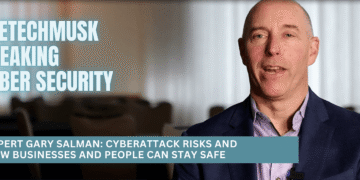These days, cybersecurity must be a top priority if you run a small or midsize business. The information of your employees, customers, and business as a whole is constantly at risk as cybercriminals are getting more knowledgeable and savvy by the day. One data breach can lead to devastating consequences, and it’s essential that your team is doing everything you can to stay a step ahead of hackers. THETECHMUSK wants to share seven of the most common mistakes businesses make with their cybersecurity, as well as tips for how to avoid them:
1. Underestimating the Risks

Too many small business owners assume that they’re not at risk of cybercrime. After all, why would hackers target a small company when they can spend their time figuring out how to get into the system of a large corporation? This kind of thinking leads many business owners to become complacent with the security practices they already have in place.
However, about half of all data breaches occur to small or midsize businesses. Hackers know that smaller companies have fewer resources and are less likely to invest in quality data protection.
2. Neglecting to Make a Recovery Plan

Even the most protected businesses are not immune to a cyberattack. And if you don’t have a recovery plan in place, it could cost you—big time. Start putting together your recovery plan now. This will involve implementing layers of infrastructure protection, using a single interface for managing your data and testing your plan regularly to ensure that it works. Look for affordable recovery plans that are secure, flexible, and easy to execute.
3. Not Investing in Software

There are plenty of free or inexpensive security software solutions on the market. The problem is that most of them are not very effective. Subpar software typically works fine for personal devices, but when it comes to your business devices, you want the best protection possible. Take time to research security software to figure out which solution will work best for your company.
4. Ignoring Software Updates

Software updates are critical for ensuring your system stays protected. While the notifications can get annoying, you shouldn’t ignore them. The updates typically include new security technology and improvements that will help keep your system one-step ahead of hackers. You may have to delay your work to restart your devices, but that time lost is nothing compared to the potential consequences of a cyber-attack.
5. Establishing Weak Passwords

If a hacker guesses your password, they’re in. Moreover, you can bet that there are many hackers sitting around, trying to crack passwords all day. That’s how they succeed in many of their breaches. Make sure all the passwords on your personal and company devices and accounts are strong. Each password should be easy for you to remember while also being difficult to decipher.
6. Using Personal Devices for Business (and Vice Versa)

Many business owners, especially those who work alone or with small teams, use their personal devices and accounts for everything, including business. Don’t do that! Invest in separate devices for your team to use only for work, and don’t merge your business social media accounts with your personal accounts if possible. Combining your personal and business technologies can open you up to a higher potential for exposure.
7. Keeping Unnecessary Accounts Open

Cybercriminals are constantly looking for forgotten accounts. If your business has any accounts that you’re no longer monitoring, you’re leaving entry points into your system for hackers. Close every single account that you’ll never use again. For instance, if you lose an employee, delete any accounts associated with that employee. If you simply stop using a particular website or app for your business, delete your account there as well. When an account is out of sight, out of mind, chances are you won’t notice a breach until after the fact.
Nothing is more important for a small or midsize business than strengthening its cybersecurity protocols. Be sure to keep the mistakes above in mind and avoid them at all costs. In addition, keep researching other strategies that will help to prevent your company from falling victim to the relentless efforts of hackers and other cybercriminals. Protecting your data is key to securing your long-term success.
Would you like to read more helpful content on tech, cybersecurity, and more? Visit thetechmusk.com today!





























